Analyzing Project Management Domains and Organizational Structures
VerifiedAdded on 2020/05/08
|5
|1258
|221
AI Summary
The document offers an in-depth reflection on project management domains and principles, emphasizing the importance of integration within projects. It explores various methods to classify projects such as size, complexity, customer involvement, and risk levels, highlighting how these classifications impact project management strategies. The essay underscores the central role of project managers in steering projects towards successful outcomes by coordinating activities and ensuring strategic alignment. Additionally, it reviews different organizational structures—such as line and staff, functional, project-based, and matrix organizations—discussing their respective advantages and challenges in managing projects. Finally, the document suggests regular 'therapy' sessions or seminars for personnel to adapt to project environments effectively, particularly within project-structured organizations, thereby fostering a more cohesive and efficient team dynamic.
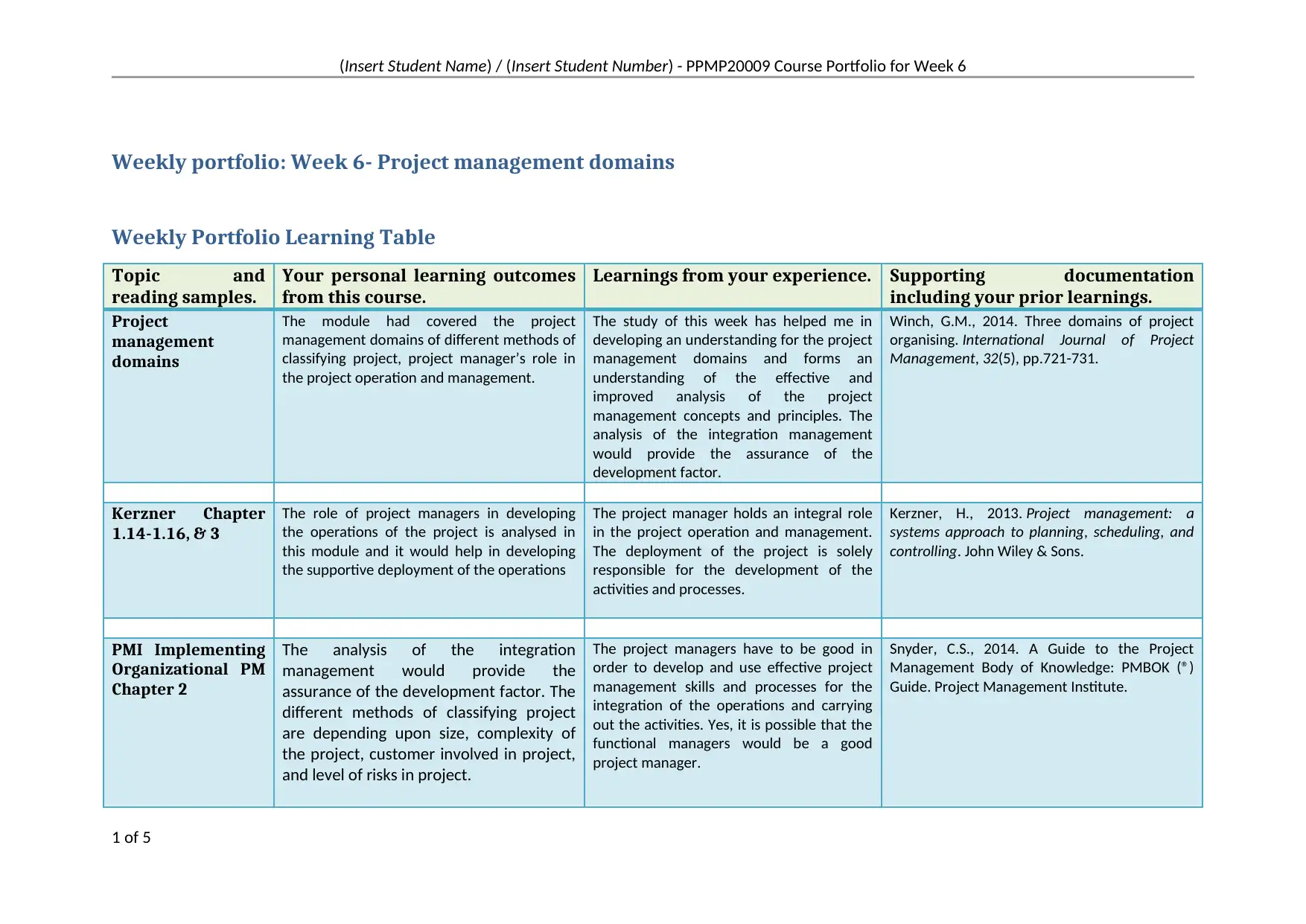
(Insert Student Name) / (Insert Student Number) - PPMP20009 Course Portfolio for Week 6
Weekly portfolio: Week 6- Project management domains
Weekly Portfolio Learning Table
Topic and
reading samples.
Your personal learning outcomes
from this course.
Learnings from your experience. Supporting documentation
including your prior learnings.
Project
management
domains
The module had covered the project
management domains of different methods of
classifying project, project manager’s role in
the project operation and management.
The study of this week has helped me in
developing an understanding for the project
management domains and forms an
understanding of the effective and
improved analysis of the project
management concepts and principles. The
analysis of the integration management
would provide the assurance of the
development factor.
Winch, G.M., 2014. Three domains of project
organising. International Journal of Project
Management, 32(5), pp.721-731.
Kerzner Chapter
1.14-1.16, & 3
The role of project managers in developing
the operations of the project is analysed in
this module and it would help in developing
the supportive deployment of the operations
The project manager holds an integral role
in the project operation and management.
The deployment of the project is solely
responsible for the development of the
activities and processes.
Kerzner, H., 2013. Project management: a
systems approach to planning, scheduling, and
controlling. John Wiley & Sons.
PMI Implementing
Organizational PM
Chapter 2
The analysis of the integration
management would provide the
assurance of the development factor. The
different methods of classifying project
are depending upon size, complexity of
the project, customer involved in project,
and level of risks in project.
The project managers have to be good in
order to develop and use effective project
management skills and processes for the
integration of the operations and carrying
out the activities. Yes, it is possible that the
functional managers would be a good
project manager.
Snyder, C.S., 2014. A Guide to the Project
Management Body of Knowledge: PMBOK (®)
Guide. Project Management Institute.
1 of 5
Weekly portfolio: Week 6- Project management domains
Weekly Portfolio Learning Table
Topic and
reading samples.
Your personal learning outcomes
from this course.
Learnings from your experience. Supporting documentation
including your prior learnings.
Project
management
domains
The module had covered the project
management domains of different methods of
classifying project, project manager’s role in
the project operation and management.
The study of this week has helped me in
developing an understanding for the project
management domains and forms an
understanding of the effective and
improved analysis of the project
management concepts and principles. The
analysis of the integration management
would provide the assurance of the
development factor.
Winch, G.M., 2014. Three domains of project
organising. International Journal of Project
Management, 32(5), pp.721-731.
Kerzner Chapter
1.14-1.16, & 3
The role of project managers in developing
the operations of the project is analysed in
this module and it would help in developing
the supportive deployment of the operations
The project manager holds an integral role
in the project operation and management.
The deployment of the project is solely
responsible for the development of the
activities and processes.
Kerzner, H., 2013. Project management: a
systems approach to planning, scheduling, and
controlling. John Wiley & Sons.
PMI Implementing
Organizational PM
Chapter 2
The analysis of the integration
management would provide the
assurance of the development factor. The
different methods of classifying project
are depending upon size, complexity of
the project, customer involved in project,
and level of risks in project.
The project managers have to be good in
order to develop and use effective project
management skills and processes for the
integration of the operations and carrying
out the activities. Yes, it is possible that the
functional managers would be a good
project manager.
Snyder, C.S., 2014. A Guide to the Project
Management Body of Knowledge: PMBOK (®)
Guide. Project Management Institute.
1 of 5
Paraphrase This Document
Need a fresh take? Get an instant paraphrase of this document with our AI Paraphraser
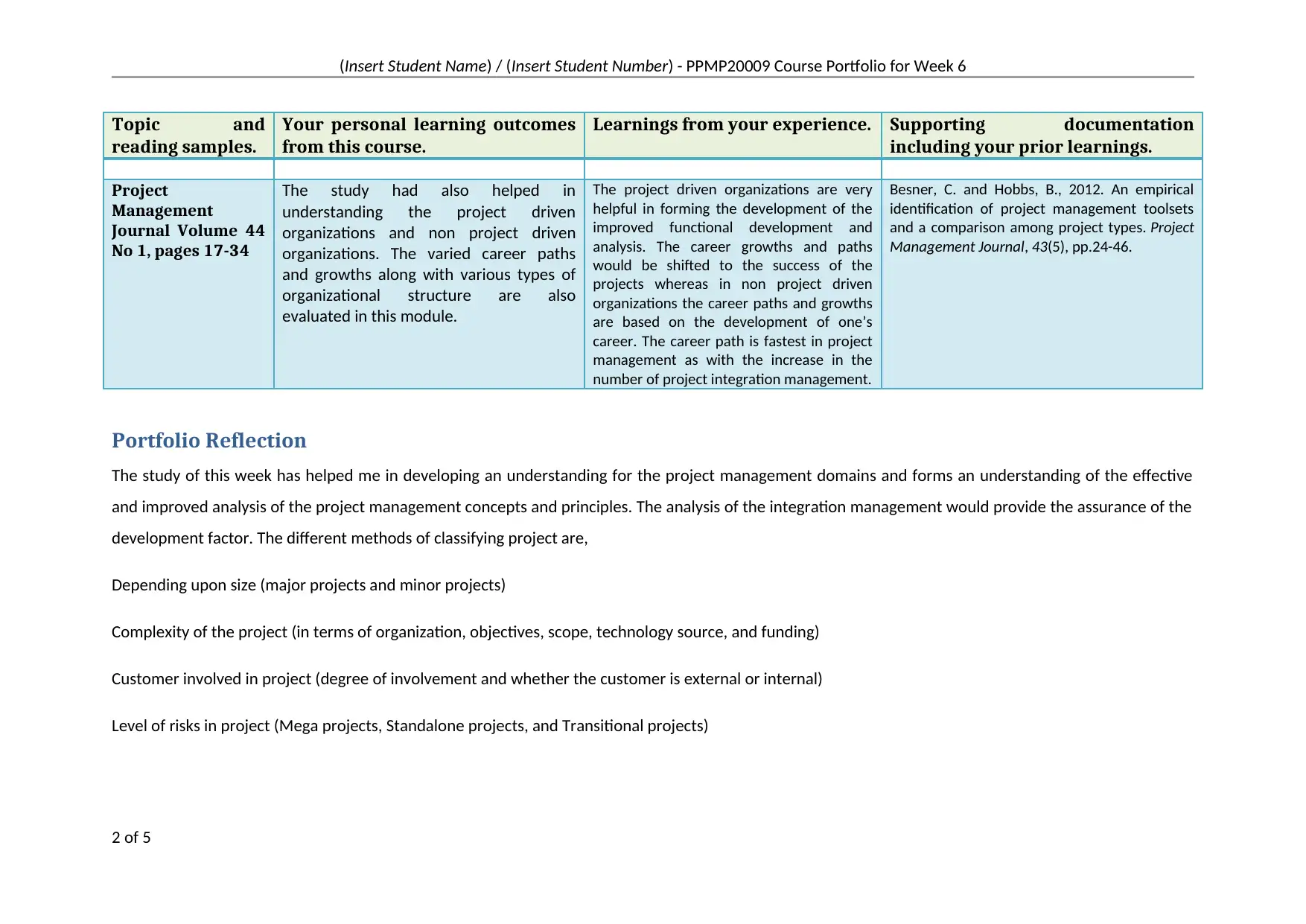
(Insert Student Name) / (Insert Student Number) - PPMP20009 Course Portfolio for Week 6
Topic and
reading samples.
Your personal learning outcomes
from this course.
Learnings from your experience. Supporting documentation
including your prior learnings.
Project
Management
Journal Volume 44
No 1, pages 17-34
The study had also helped in
understanding the project driven
organizations and non project driven
organizations. The varied career paths
and growths along with various types of
organizational structure are also
evaluated in this module.
The project driven organizations are very
helpful in forming the development of the
improved functional development and
analysis. The career growths and paths
would be shifted to the success of the
projects whereas in non project driven
organizations the career paths and growths
are based on the development of one’s
career. The career path is fastest in project
management as with the increase in the
number of project integration management.
Besner, C. and Hobbs, B., 2012. An empirical
identification of project management toolsets
and a comparison among project types. Project
Management Journal, 43(5), pp.24-46.
Portfolio Reflection
The study of this week has helped me in developing an understanding for the project management domains and forms an understanding of the effective
and improved analysis of the project management concepts and principles. The analysis of the integration management would provide the assurance of the
development factor. The different methods of classifying project are,
Depending upon size (major projects and minor projects)
Complexity of the project (in terms of organization, objectives, scope, technology source, and funding)
Customer involved in project (degree of involvement and whether the customer is external or internal)
Level of risks in project (Mega projects, Standalone projects, and Transitional projects)
2 of 5
Topic and
reading samples.
Your personal learning outcomes
from this course.
Learnings from your experience. Supporting documentation
including your prior learnings.
Project
Management
Journal Volume 44
No 1, pages 17-34
The study had also helped in
understanding the project driven
organizations and non project driven
organizations. The varied career paths
and growths along with various types of
organizational structure are also
evaluated in this module.
The project driven organizations are very
helpful in forming the development of the
improved functional development and
analysis. The career growths and paths
would be shifted to the success of the
projects whereas in non project driven
organizations the career paths and growths
are based on the development of one’s
career. The career path is fastest in project
management as with the increase in the
number of project integration management.
Besner, C. and Hobbs, B., 2012. An empirical
identification of project management toolsets
and a comparison among project types. Project
Management Journal, 43(5), pp.24-46.
Portfolio Reflection
The study of this week has helped me in developing an understanding for the project management domains and forms an understanding of the effective
and improved analysis of the project management concepts and principles. The analysis of the integration management would provide the assurance of the
development factor. The different methods of classifying project are,
Depending upon size (major projects and minor projects)
Complexity of the project (in terms of organization, objectives, scope, technology source, and funding)
Customer involved in project (degree of involvement and whether the customer is external or internal)
Level of risks in project (Mega projects, Standalone projects, and Transitional projects)
2 of 5
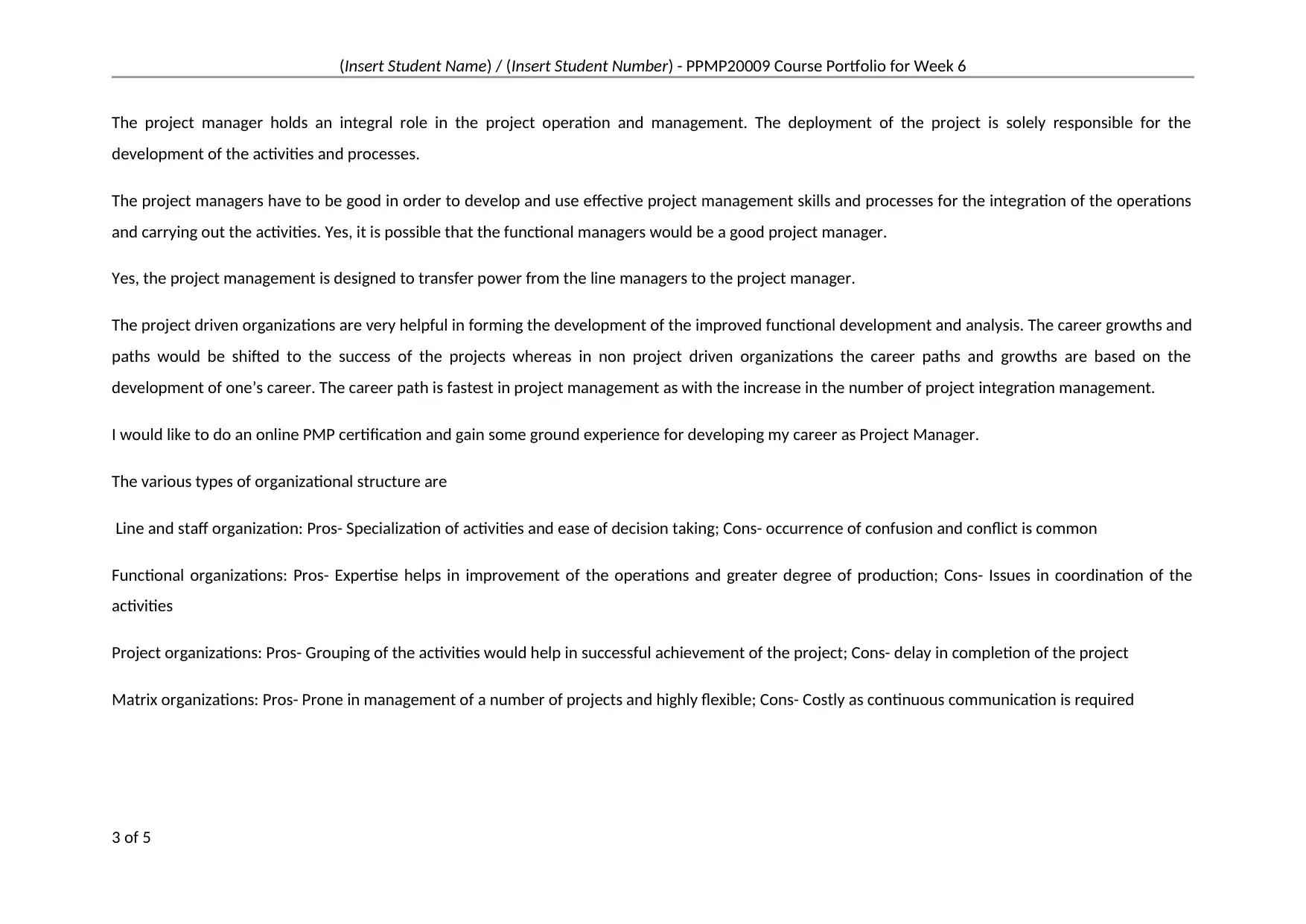
(Insert Student Name) / (Insert Student Number) - PPMP20009 Course Portfolio for Week 6
The project manager holds an integral role in the project operation and management. The deployment of the project is solely responsible for the
development of the activities and processes.
The project managers have to be good in order to develop and use effective project management skills and processes for the integration of the operations
and carrying out the activities. Yes, it is possible that the functional managers would be a good project manager.
Yes, the project management is designed to transfer power from the line managers to the project manager.
The project driven organizations are very helpful in forming the development of the improved functional development and analysis. The career growths and
paths would be shifted to the success of the projects whereas in non project driven organizations the career paths and growths are based on the
development of one’s career. The career path is fastest in project management as with the increase in the number of project integration management.
I would like to do an online PMP certification and gain some ground experience for developing my career as Project Manager.
The various types of organizational structure are
Line and staff organization: Pros- Specialization of activities and ease of decision taking; Cons- occurrence of confusion and conflict is common
Functional organizations: Pros- Expertise helps in improvement of the operations and greater degree of production; Cons- Issues in coordination of the
activities
Project organizations: Pros- Grouping of the activities would help in successful achievement of the project; Cons- delay in completion of the project
Matrix organizations: Pros- Prone in management of a number of projects and highly flexible; Cons- Costly as continuous communication is required
3 of 5
The project manager holds an integral role in the project operation and management. The deployment of the project is solely responsible for the
development of the activities and processes.
The project managers have to be good in order to develop and use effective project management skills and processes for the integration of the operations
and carrying out the activities. Yes, it is possible that the functional managers would be a good project manager.
Yes, the project management is designed to transfer power from the line managers to the project manager.
The project driven organizations are very helpful in forming the development of the improved functional development and analysis. The career growths and
paths would be shifted to the success of the projects whereas in non project driven organizations the career paths and growths are based on the
development of one’s career. The career path is fastest in project management as with the increase in the number of project integration management.
I would like to do an online PMP certification and gain some ground experience for developing my career as Project Manager.
The various types of organizational structure are
Line and staff organization: Pros- Specialization of activities and ease of decision taking; Cons- occurrence of confusion and conflict is common
Functional organizations: Pros- Expertise helps in improvement of the operations and greater degree of production; Cons- Issues in coordination of the
activities
Project organizations: Pros- Grouping of the activities would help in successful achievement of the project; Cons- delay in completion of the project
Matrix organizations: Pros- Prone in management of a number of projects and highly flexible; Cons- Costly as continuous communication is required
3 of 5
⊘ This is a preview!⊘
Do you want full access?
Subscribe today to unlock all pages.

Trusted by 1+ million students worldwide
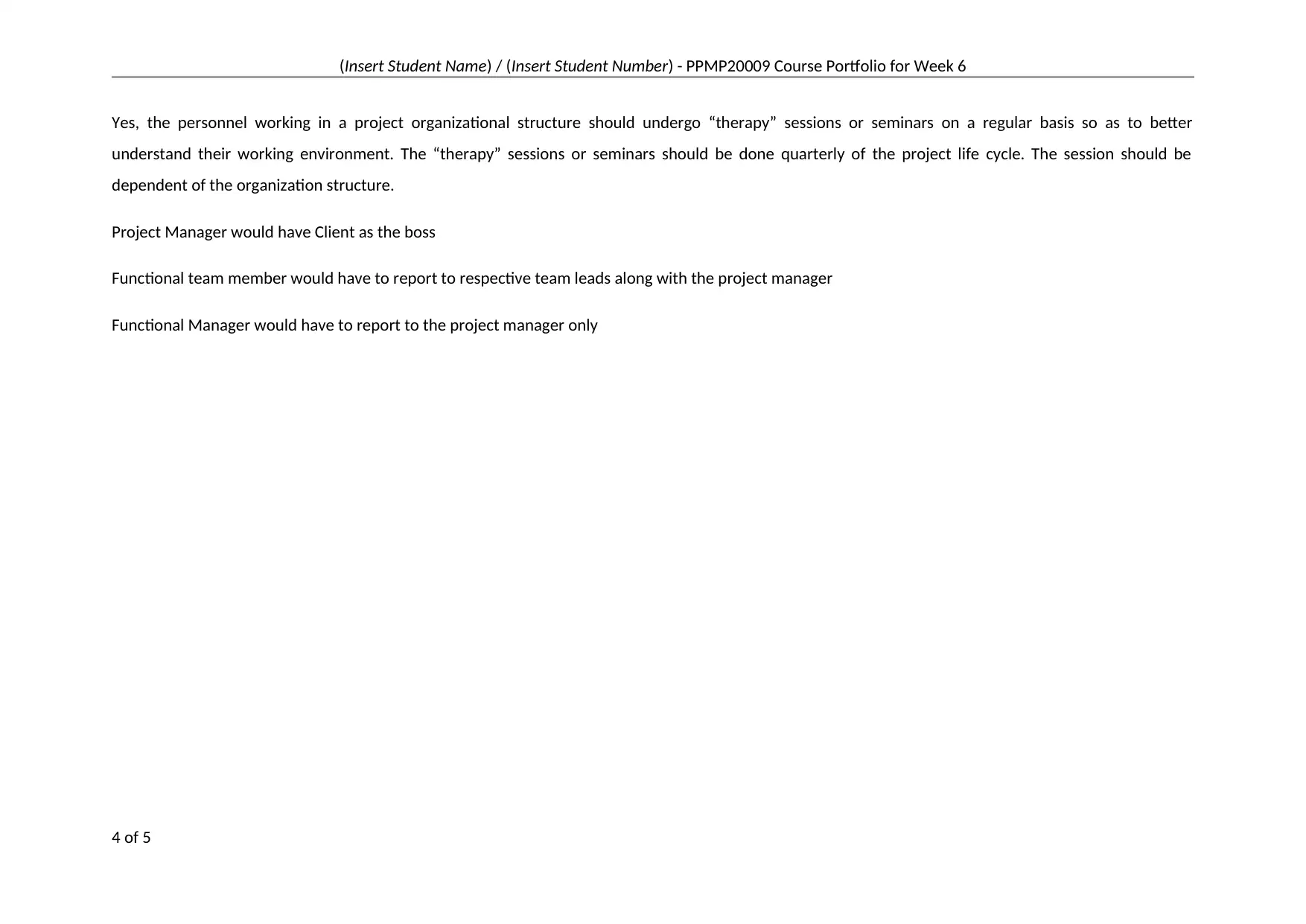
(Insert Student Name) / (Insert Student Number) - PPMP20009 Course Portfolio for Week 6
Yes, the personnel working in a project organizational structure should undergo “therapy” sessions or seminars on a regular basis so as to better
understand their working environment. The “therapy” sessions or seminars should be done quarterly of the project life cycle. The session should be
dependent of the organization structure.
Project Manager would have Client as the boss
Functional team member would have to report to respective team leads along with the project manager
Functional Manager would have to report to the project manager only
4 of 5
Yes, the personnel working in a project organizational structure should undergo “therapy” sessions or seminars on a regular basis so as to better
understand their working environment. The “therapy” sessions or seminars should be done quarterly of the project life cycle. The session should be
dependent of the organization structure.
Project Manager would have Client as the boss
Functional team member would have to report to respective team leads along with the project manager
Functional Manager would have to report to the project manager only
4 of 5
Paraphrase This Document
Need a fresh take? Get an instant paraphrase of this document with our AI Paraphraser
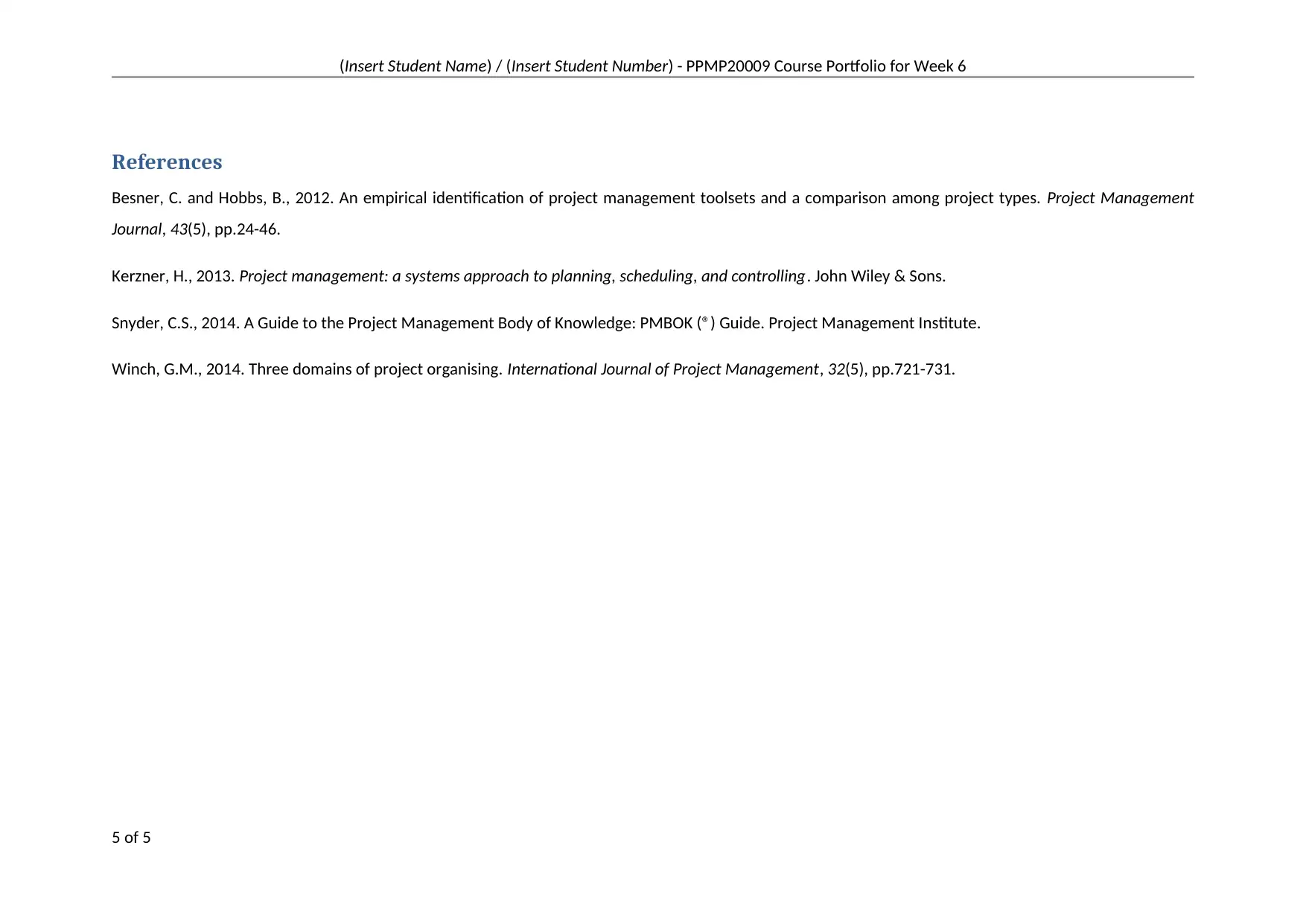
(Insert Student Name) / (Insert Student Number) - PPMP20009 Course Portfolio for Week 6
References
Besner, C. and Hobbs, B., 2012. An empirical identification of project management toolsets and a comparison among project types. Project Management
Journal, 43(5), pp.24-46.
Kerzner, H., 2013. Project management: a systems approach to planning, scheduling, and controlling. John Wiley & Sons.
Snyder, C.S., 2014. A Guide to the Project Management Body of Knowledge: PMBOK (®) Guide. Project Management Institute.
Winch, G.M., 2014. Three domains of project organising. International Journal of Project Management, 32(5), pp.721-731.
5 of 5
References
Besner, C. and Hobbs, B., 2012. An empirical identification of project management toolsets and a comparison among project types. Project Management
Journal, 43(5), pp.24-46.
Kerzner, H., 2013. Project management: a systems approach to planning, scheduling, and controlling. John Wiley & Sons.
Snyder, C.S., 2014. A Guide to the Project Management Body of Knowledge: PMBOK (®) Guide. Project Management Institute.
Winch, G.M., 2014. Three domains of project organising. International Journal of Project Management, 32(5), pp.721-731.
5 of 5
1 out of 5
Related Documents
Your All-in-One AI-Powered Toolkit for Academic Success.
+13062052269
info@desklib.com
Available 24*7 on WhatsApp / Email
![[object Object]](/_next/static/media/star-bottom.7253800d.svg)
Unlock your academic potential
Copyright © 2020–2026 A2Z Services. All Rights Reserved. Developed and managed by ZUCOL.





